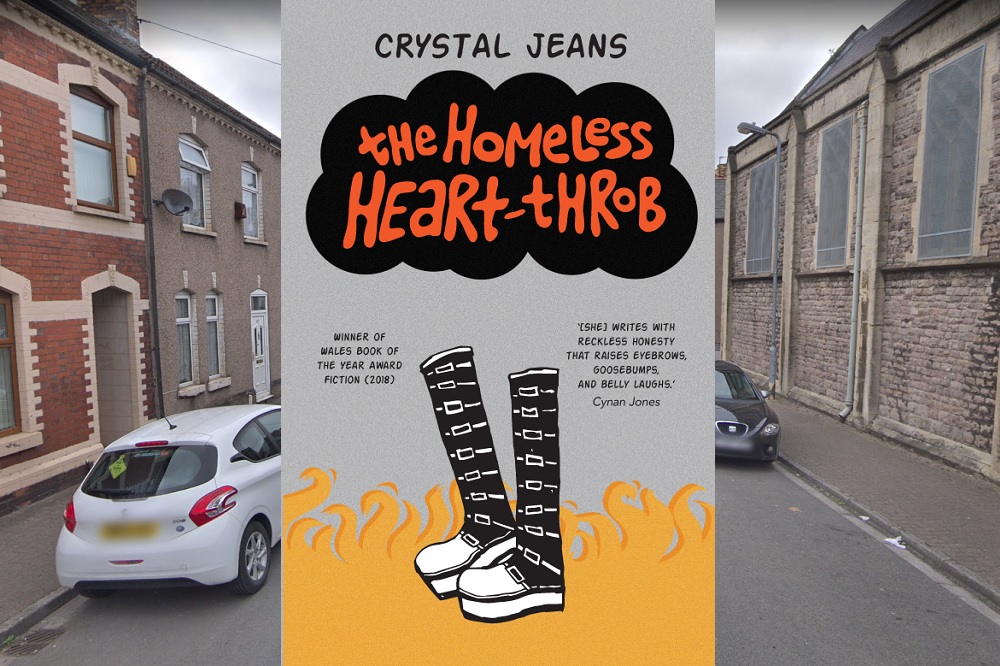Review: The Homeless Heart-throb is incandescently entertaining

Jon Gower
It’s not often you imagine people having to buckle up before reading a bunch of short stories but with this one you need something to hold you onto or into your seat: this is Formula 1 prose that goes at one hell of a lick.
There’s a whole lot of life – twisted, addicted, hopeless life – crammed into the eighteen tales. Some stories are seemingly mundance: in one a postman simply tries to solve the mystery of the cigarette carton left each week in a mailbox. Others are just out there – in ‘Why Do People Have to Be So Mean?’ a hairdresser dallies very seriously with the idea of murdering an inconsiderate customer, in a story which pulses with violence as does blood in a jugular.
In ‘Piss on the Flames’ a carer in a home for the demented elderly buckles under the stress of the job and just goes off on one, careering around the place doing harm. In ‘Japanese Flag’ a step-daughter exacts horrendous revenge on her new step-father Andrew for his boorish, awful behaviour, aided by a judicious selection of poisons, slowly administered.
Many of tales in The Heartless Heart-throb give us glimpses of the world of a former mechanic, now homeless man nicknamed Monsterberry Crunch, who once had a brief flurry of fame on TV’s Stars in their Eyes, mimicking Roxy Music’s Bryan Ferry but has most certainly hit the skids subsequently. He’s often found hanging around in many of these stories, sometimes just drinking cider in the lanes behind Tamerlane Road or in the local graveyard.
On one stomach-testing occasion he is seduced by a housewife who makes the simple equation that tramp equals filth and concludes that she craves filth. After a bit of Chopin and a hurried coitus with Monsterberry she gives him a parting gift of ‘three pairs of my husband’s boxers, a tuna sandwich and a dusty bottle of Drambuie left over from two Christmases ago’.
Throughout this frenetic and energetic collection there are plenty of reminders that people get up to some weird shit. The story ‘Japanese Flag’ opens with the line “The first time I ever had an orgasm it was with my stepfather’s electric toothbrush.” In ‘God and the Roach’ sadomasochistic role-play gets very complicated indeed when the humiliated man has to give his dominatrix a lift to the hospital in his silver Audi.
Pungent
Throughout the writing is bang on the money and sharp as scalpels. It often has both economy and impact: Crystal Jeans is a mistress of concision. A weak yellow sun sets, ‘striping the sky the colour of lemon cream pie.’ In the north of Wales a woman stays near a ‘small, furious river that would eat my toe like a piranha if I dared dip in it.’ Walking along its edge the water is ‘viciously swirling itself into a brown froth. I go down to the little bank that is all mud and tufts of bramble weed.’ Elsewhere, some blood, fallen on snow, is kicked until ‘it goes crystal-pink like a drained Slush Puppy.’ A hardened drinker imagines his liver as looking like a ‘tandoori chicken breast, all lumpy, red skin…’
Such sharp and often pungent imagery abounds. But this young writer can also dial it down when the occasion demands. In ‘Snow Angels’ a mortifying accusation of incest stuns two characters into silence: ‘We went quiet, Just the whispery puh of puckered lips taking nips of nicotine, the sizzle of paper burning down. The ticking clock hand. Then the sound of the oven pinging…’ to announce that the pizza’s done. This both punctures the moment and brings relief after its weightiness ansd tension.
The writing is also peppered throughout with references to popular culture, with a lot of characters who clearly spend a lot of time glued to the goggle box, watching Buffy the Vampire Slayer, Gladiators and The Harry Enfield Show or films such as Dirty Dancing and horror flicks such as The Craft.
Zinging
Cardiff-based Crystal Jeans burst onto the Welsh literary scene – as the cliche has it – when she won the Wales Book of the Year in 2018 for her antic novel Light Switches Are My Kryptonite about Sylvester, a dysfunctional boy who spends a lot of time in his room, applying glitter to the light switches. The Homeless Heart-throb proves this was far from a one-off success for here is modern life pinned like insects, fluttering and struggling to the cork boards of its pages.
Even minor characters lodge firmly in the mind, such as Mark, a denizen of an old people’s home who is often fast asleep, so much so that when he wakes up ‘blinking behind his massive glasses like a cartoon mole’ the carer looking after him feels ‘almost uneasy, as if Lazarus has just twitched a finger.’
With a cast list that includes a fat Goth from Pontypridd named Morticia Filth, a damaged dog called Bilbo living lives on Yahya-Khan Avenue or Hideli Tojo Avenue where you might find a pub called the Slaughterhouse Inn this is an exaggerated world, pumped up, vivid and incandescently entertaining. This book burns with a rare energy, with real flares of language and afterburns of insight and it will certainly make some readers question whether their lives are perhas too dowdy and safe. There are passages to make you squirm just as there are others which promise guaranteed delight.
One thing is for certain: Crystal Jeans is the real deal, a writer who seems to hold up a fly-specked mirror to the world, reflecting it back at us in zinging prose that dazzles even as it unsettles and disturbs.
Support our Nation today
For the price of a cup of coffee a month you can help us create an independent, not-for-profit, national news service for the people of Wales, by the people of Wales.






